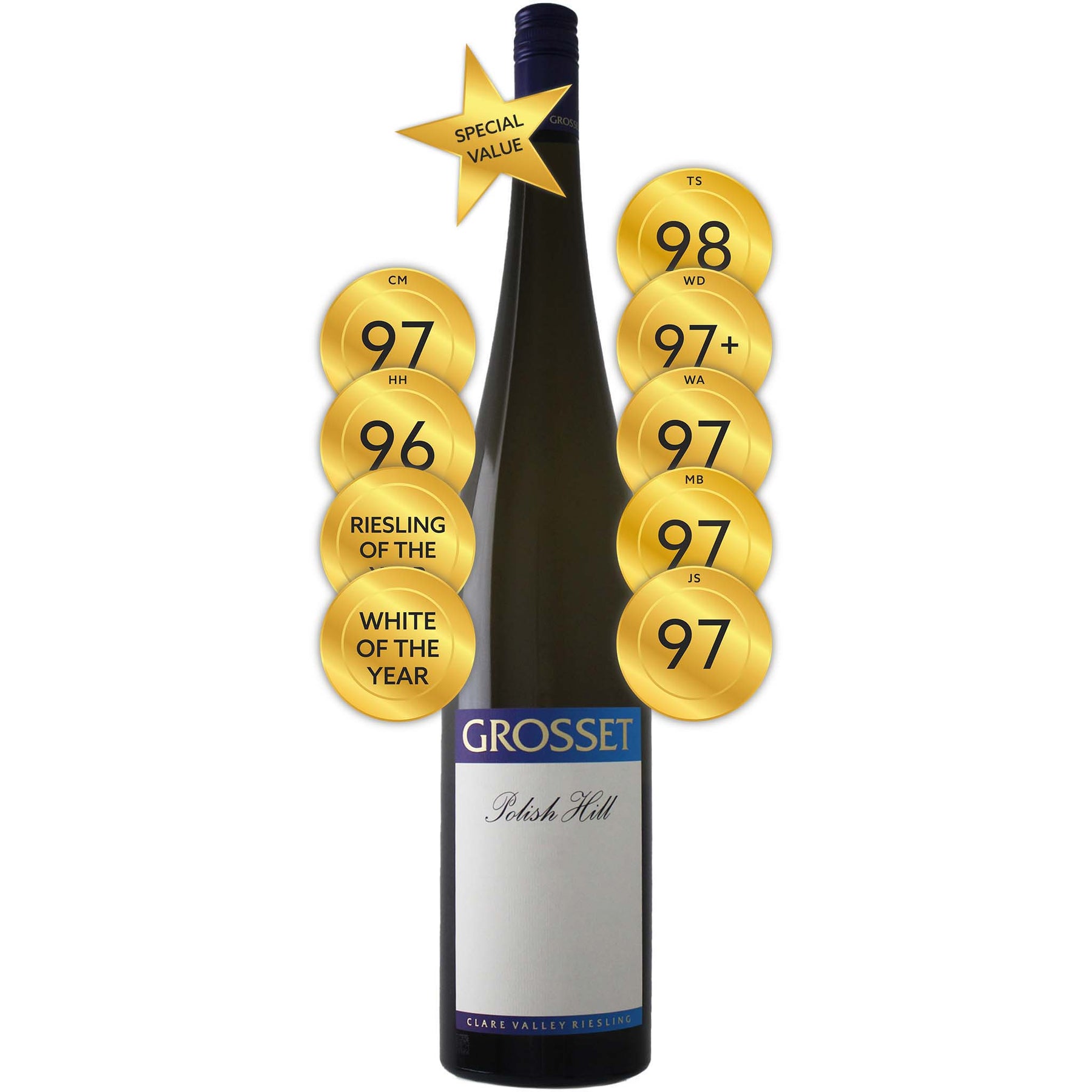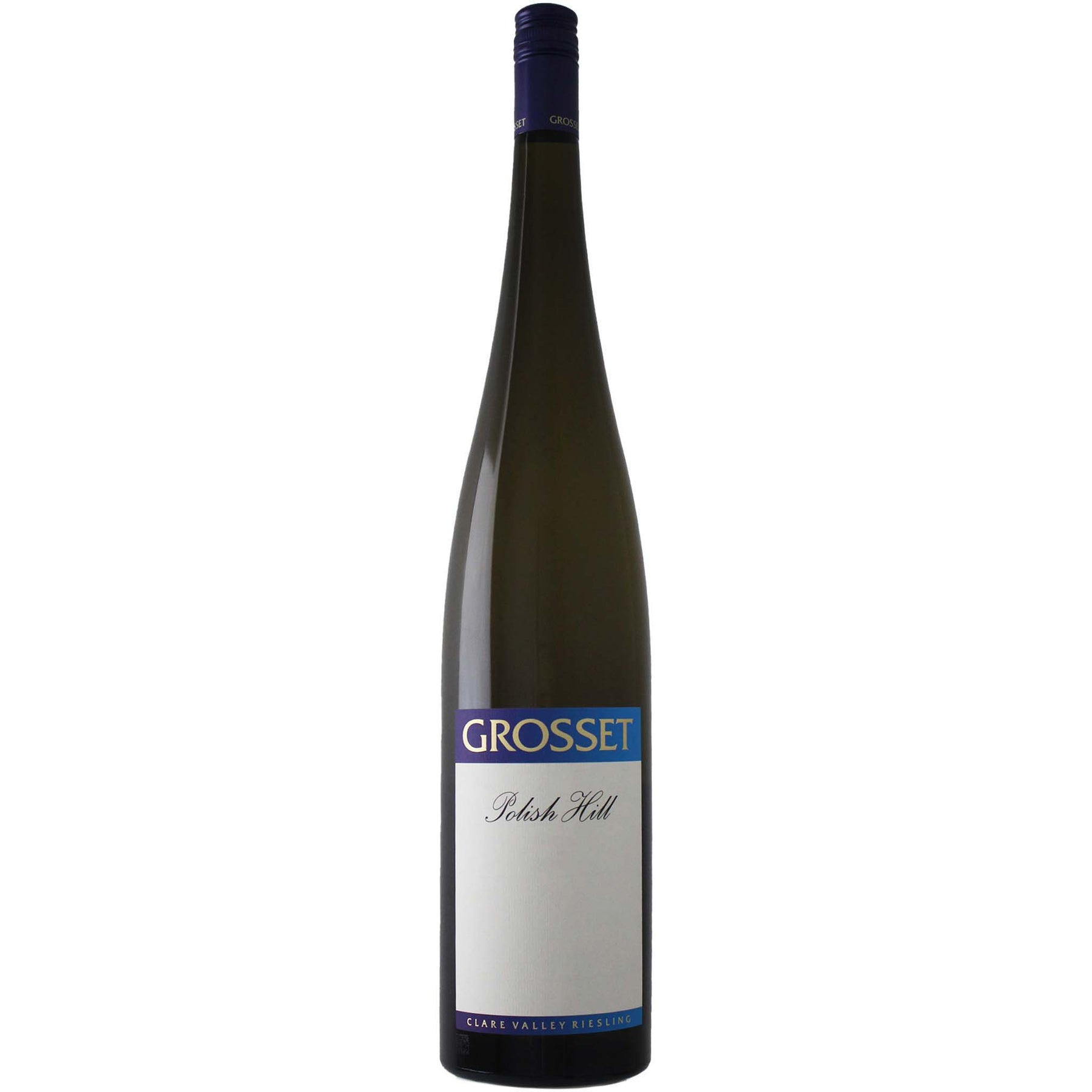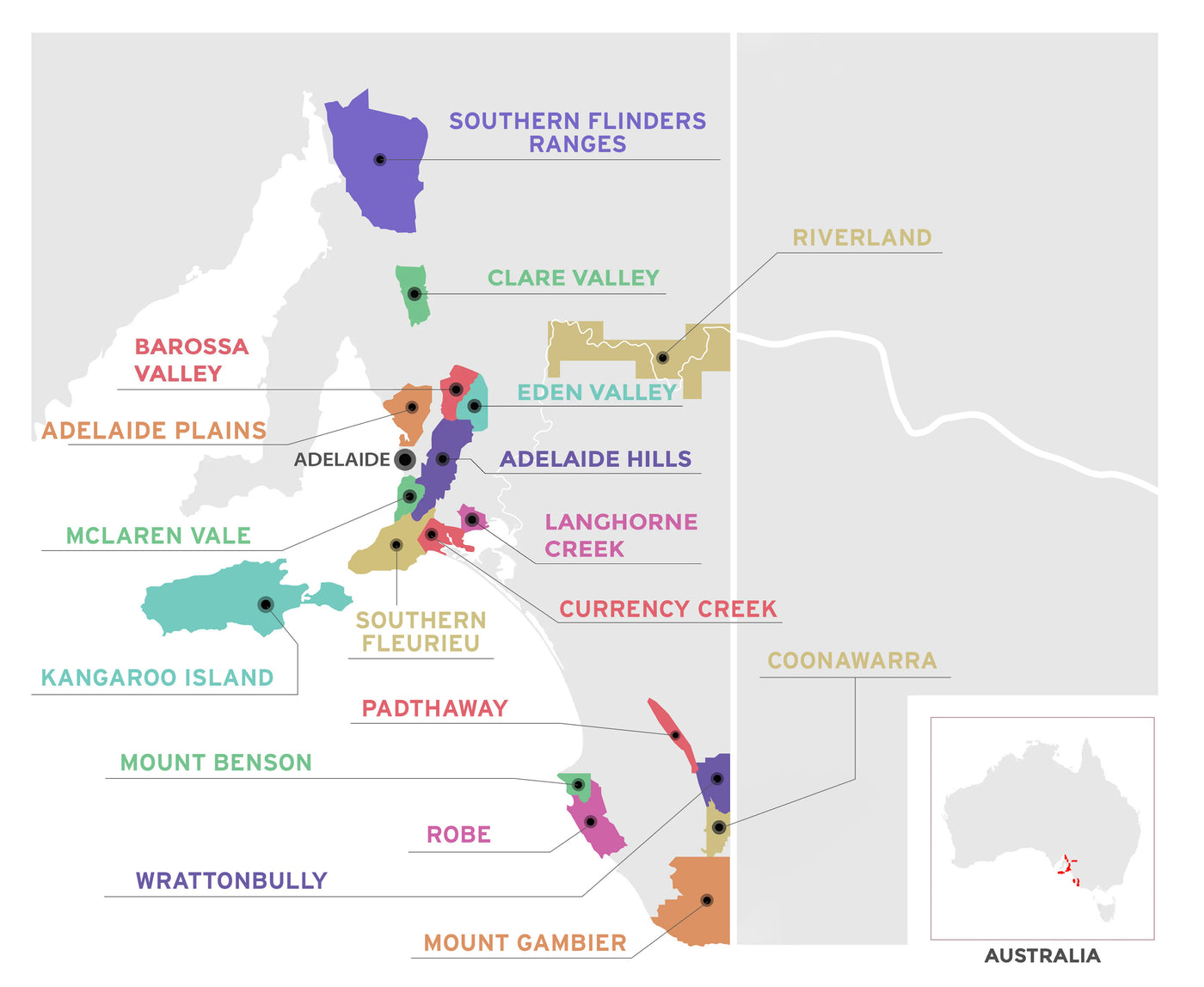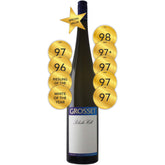

Grosset Polish Hill Riesling 2024 (1500ml)
Style: White Wine
Variety: Riesling
Closure: Screwcap
Grosset Polish Hill Riesling 2024 (1500ml)
Warehouse
34 Redland Drive
Vermont VIC 3133
Australia
Critic Score: 98
Alcohol: 12.1%
Size: 1500 ml
Drink by: 2055
White Wine of the Year 2024 - Tyson Stelzer
Riesling of the Year 2024 - Tyson Stelzer
Jeff Grosset proclaims 2024 as the most pristine fruit he has seen since he first planted in the Clare Valley in the early 1980s.
"Time will most certainly reveal this to be one of the greatest in Grosset’s 44 vintage history." Tyson Stelzer
The Grosset Polish Hill Riesling is arguably Australia's best Riesling and one of the New World's greatest Rieslings. For many years it has been a benchmark wine for the Clare Valley. The wine possesses wonderful perfume, incredible fruit purity and intensity of flavour, has great finesse and ages spectacularly. The first vintage of the Grosset Polish Hill Riesling was produced in 1981. Langton's classifies Grosset Polish Hill Riesling as 'Exceptional'. Only 17 wines in total make this grade, of which only 3 are white wines.
"By jove! Polish Hill 2024 is as desperately gorgeous as any of the highlights of Grosset’s lauded career. Dainty white lily, granny smith apple and lemon blossom of pinpoint perfection rise in a dramatic crescendo over a powerful core of talcum powder structure, crystalline acidity and ancient slate texture, tracing a finish unrelenting for a full sixty seconds. It is at once lighter than air and yet possessing a resolute determination that sets a future in the cellar as enduring as the career of its maker. The essence of the Clare, time will most certainly reveal this to be one of the greatest in Grosset’s 44 vintage history, and one of the finest Australian rieslings conjured yet." Tyson Stelzer
"A Polish Hill for the ages; a white that will delight while young; and yet age as gracefully as we hope to. At its core, it is intense, powerful and fine, pure lime juice that tingles on the mid-palate and shows impressive length even now. One of the finest wines to come from the Grosset Polish Hill Vineyard. Cellar? As long as you like – up to 25 years, or drink now. " Grosset
Expert reviews
"Thanks to a cool season and biodynamic farming, Jeff Grosset proclaims 2024 as the most pristine fruit he has seen since he first planted in the Clare Valley in the early 1980s. By jove! Polish Hill 2024 is as desperately gorgeous as any of the highlights of (Grosset’s) lauded career. Dainty white lily, granny smith apple and lemon blossom of pinpoint perfection rise in a dramatic crescendo over a powerful core of talcum powder structure, crystalline acidity and ancient slate texture, tracing a finish unrelenting for a full sixty seconds. It is at once lighter than air and yet possessing a resolute determination that sets a future in the cellar as enduring as the career of its maker. The essence of the Clare, time will most certainly reveal this to be one of the greatest in Grosset’s 44 vintage history, and one of the finest Australian rieslings conjured yet. It is a worthy winner of my Riesling of the Year and my White Wine of the Year. Drink: 2024-2064." Tyson Stelzer - 98 points and White Wine of the Year 2024 and Riesling of the Year 2024
"Purity, racy acidity, presence and panache. The thrilling new vintage of Australia's most collected riesling has just landed, and it is a stunner. Jeff Grosset, master of organics, biodynamics and consistency, has crafted a super wine from a cool year with lemon/lime zest, green apple, grapefruit and zingy minerality playing starring roles. There is a linearity to this wine that sets it apart and it has immediate appeal, but will cellar for decades in the right conditions. I'd pair this with kingfish sashimi. Serve cool, but not too cold, and give it few minutes to breathe. A star turn in anyone's language - a Mahler symphony of pristine excellence." Winsor Dobbin, Gourmet on the Road - 97.5 points and Wine of the Week
"This needs no introduction; safe to say, this is one of the most delicious young releases of this wine. Immediate appeal in abundant jasmine floral lift, green apple fruitiness, soft lime elements, ginger cake, blackcurrant touches and a wellspring of saline minerality. There's a juiciness, though strict ribbons of pulverised pumice and granitic mineral character find chew and pucker here, too. In all that, the intensity is somewhat dialled down while drinkability is through the roof. No matter, the character shifts each year in degree; it's a stellar wine, full of inimitable character and a finesse that Grosset does so well. Drink by 2040." Mike Bennie, Halliday Wine Companion - 97 points and Special Value Wine ★
"Exceptional concentration of fruit flavour here. This is straight and direct but wow it has a charge to it. Lime, chalk, white flower and wet slate flavours storm through the palate in emphatic fashion. There’s an extra note to the finish that I can’t quite place but I’ll call it brine splashed on potpourri splashed on rocks. The longer I sit and taste this wine the more I think that this is a Grosset riesling for the ages. Drink – 2025-2044+." Campbell Mattinson, The Wine Front - 97 points
"This is a benchmark in Australian Riesling and widely loved by collectors. The wine ages gracefully and slowly; the latent power that is stowed away on release is revealed in time, making this one of the greats in Australia. So here, the 2024 Polish Hill Riesling is thunderous and rolling in its intensity and energy. The citrus fruits gather speed over a grounding of crushed rocks and minerals, while the finish culminates in a sandstorm of flavor and texture. This is an excellent wine. It is fleshy and powerful, tightly coiled and salty. It's so good. Drink: 2024 - 2044." Erin Larkin, Wine Advocate - 97 points
"Intensely complex and inviting aromas of flint, lemon peel, crushed stones, gun smoke and white nectarines. The palate is tightly wound, with laser-like acidity and underlying power, giving notes of grapefruit peel, orange blossoms and candied lime zest. An Australian classic that’s been made every year since 1981. It will age for decades to come. Excellent. Drink or hold. Screw cap." James Suckling, JamesSuckling.com - 97 points
"Spicy, dried herb and nettle aromas, a faint whiff of pastry-like yeastiness, the palate crisp and refined, intense and long with penetrating qualities and real persistence. A ripping young riesling: all it needs is time. Drink: 2026-2038." Huon Hooke, The Real Review - 96 points
Awards
White Wine of the Year 2024 - Tyson Stelzer
Riesling of the Year 2024 - Tyson Stelzer
Special Value Wine – Halliday Wine Companion ★
Polish hill vineyard
The Grosset Polish Hill Vineyard is an eight‑hectare, organically certified vineyard in the Clare Valley. The vineyard is named after the nearby Hill River Settlement established by Polish immigrants in the 1840s. The vineyard is relatively close-planted and comprises three clones of Riesling, two German and one rare local clone, and produces an average of just two bottles of wine per vine.
Located on a hard rock site at an elevation of 460-480 metres, the gently sloping vineyard sits on silt and shallow shales over a thin crust of clay and gravel, on top of a bed of blue slate estimated to be 500 million years old. The vines struggle to draw nutrients from the soil, so the bunches and berries are small and thick skinned. This vineyard exemplifies how old-rock profiles can contribute to a wine's character.
The vines are dry-grown on a modified ballerina trellising system, and completely hand tended and organically farmed. A major challenge of this site is the variability in vigour from one vine to the next. This demands more intense labour input and hand-tending skill – varied to suit each vine – to achieve balanced vine growth and even fruit ripening. Vintage takes place in early April, normally a few weeks later than the Springvale Vineyard in Watervale.
"The Grosset Polish Hill Riesling has incredible perfume and fruit purity, the lime/floral fruit profile balanced by a fine cut of acidity. This long-lived beautifully aromatic and concentrated wine does much to define great Clare Valley Riesling." Andrew Caillard MW

The four Grosset estate-owned vineyards
About Jeffrey Grosset

"Jeffrey Grosset wears the unchallenged mantle of Australia's foremost riesling maker. Grosset's pre-eminence is recognised both domestically and internationally." James Halliday
Grosset was 15 when his father, an electrician, came home with a bottle of wine and shared it with the family. It was riesling and Jeffrey was gobsmacked. So began the Grosset story. The following year Jeffrey enrolled at Roseworthy Agricultural College, completing an Agriculture degree in 1973 and an Oenology degree in 1975. At the age of 21 Jeffrey started work at Seppelt Great Western, before heading to a German winery with a 1000-tonne crush as assistant winemaker, only to find the chosen French winemaker had changed his mind, leaving Grosset in charge. He subsequently returned to Australia and worked at Lindeman's Karadoc winery with its 30,000-tonne crush. But ultimately he wanted to start his own label.
In 1981 Jeffrey purchased an old milk depot in the historic township of Auburn 1981 and established Grosset Wines. He produced four wines that vintage under his own label, 800 dozen bottles in total. Now, 42 years later, Grosset is regarded as arguably the best maker of riesling in Australia and produces nine wines and 11,000 bottles per vintage.
Grosset is not shy about challenging tradition and questioning accepted practices. In the late 1980s, he was the leader of a successful movement to only allow the use of the word Riesling on Australian wines that were made specifically from the Riesling grape. Until that point, a significant number of Australian wines with Riesling on their label were made from other grape varieties.
Grosset was also the driving force behind a decision in 2000 by Clare Valley Riesling producers to switch to screwcap closures for their wines and to encourage Australian and New Zealand winemakers to do the same, and for the public, retailers and media to embrace the change. He continues to privately fund research into the subject.
Next, he established the Grosset Gaia Fund, donating to charities supporting youth, the arts and the environment. Recently he has led the way for Australian winemakers to use blockchain technology for verification of product provenance, authenticity and seal integrity.
Jeffrey Grosset has received a great deal of local and international recognition for his winemaking. In 1998, he was the first recipient of "Australian Winemaker of the Year" from Gourmet Traveller Wine magazine and was named the "International Riesling Winemaker of the Year" at the Riesling Summit in Hamburg, Germany. He was nominated in 2005 as one of the world's "50 Most Influential Winemakers" by Wine & Spirits and in 2006, named as one of the "Top 10 White Winemakers" in the world by Decanter magazine.
Grosset's philosophy has remained steadfast over the years, the emphasis is on purity of fruit. The estate vineyards, which are ACO certified organic, are hand-tended and each bunch of grapes is harvested at optimum ripeness. The winemaking process is gentle and uncomplicated. With dedication, discipline and the application of knowledge garnered through decades of experience, the result is the finest expression of variety and place.
Clare valley
 Strung together by half a dozen small towns, Clare Valley is one of Australia's oldest wine producing regions. Nestled amongst rolling hills in the northern Mount Lofty Ranges, it is one of South Australia's prettiest valleys and is quite small, covering a length of 35 km.
Strung together by half a dozen small towns, Clare Valley is one of Australia's oldest wine producing regions. Nestled amongst rolling hills in the northern Mount Lofty Ranges, it is one of South Australia's prettiest valleys and is quite small, covering a length of 35 km.
The region is unofficially subdivided into five sub-regions: Clare, Sevenhill, Watervale, Polish Hill River and Auburn. Each sub-region produces different styles of wine which reflect the influence of terroir; the different climate, soil and geography.
Clare Valley is famous for its rieslings. Vibrant lime juice, citrus and bracing acidity are signatures of Clare Valley riesling. They are magical wines with enchanting purity and a powerful sense of place. They improve with age and take on glorious honey and toasty characters over time. It is the slate of the Polish Hill River as distinct from the limestone of Watervale that creates the differences between the wines. Rieslings from the Polish Hill River are tightly woven and austere, with great minerality and longevity. The Watervale area makes a more approachable and mouthwatering style.

South Australia
South Australian is responsible for more than half the production of all Australian wine. It is home to more than 900 wineries across 18 wine regions. The regions are Adelaide Hills, Adelaide Plains, Barossa Valley, Clare Valley, Coonawarra, Currency Creek, Eden Valley, Kangaroo Island, Langhorne Creek, McLaren Vale, Mount Benson, Mount Gambier, Padthaway, Riverland, Robe, Southern Fleurieu, Southern Flinders Ranges and Wrattonbully.
Many of the well-known names in the South Australian wine industry established their first vineyards in the late 1830s and early 1840s. The first vines in McLaren Vale were planted at Reynella in 1839 and Penfold's established Magill Estate on the outskirts of Adelaide in 1844.
South Australia has a vast diversity in geography and climate which allows the State to be able to produce a range of grape varieties - from cool climate Riesling in the Clare and Eden Vallies to the big, full bodied Shiraz wines of the Barossa Valley and McLaren Vale. Two of Australia's best-known wines, Penfolds Grange and Henschke Hill of Grace, are produced here. There is much to discover in South Australia for the wine lover.


